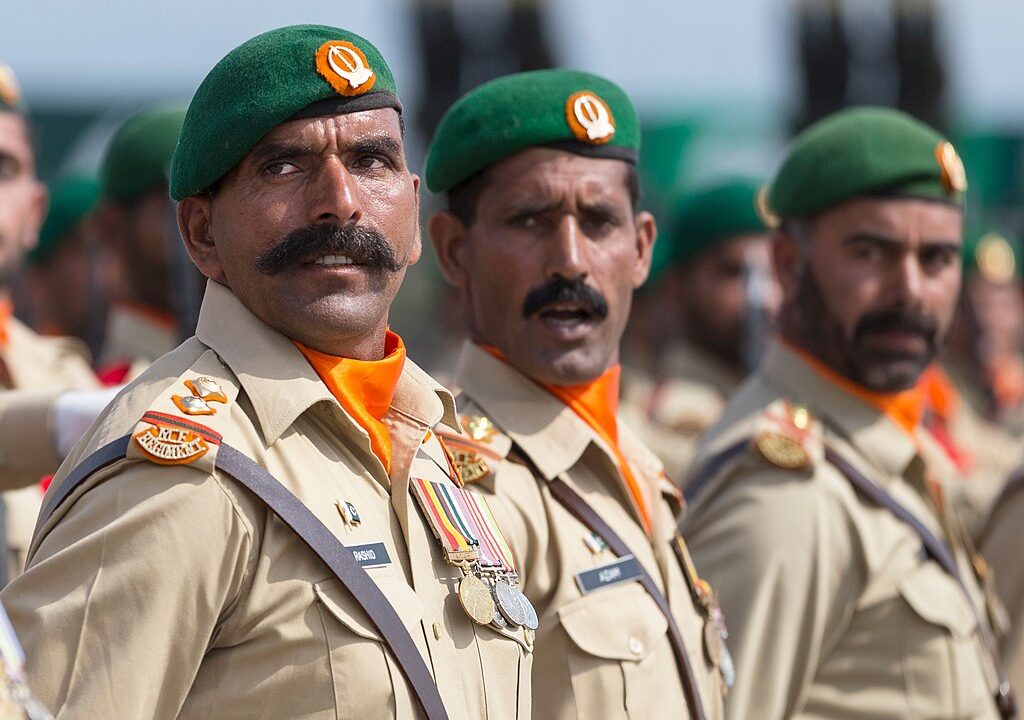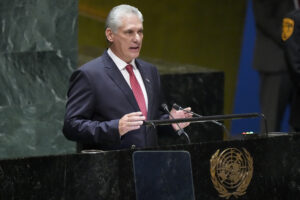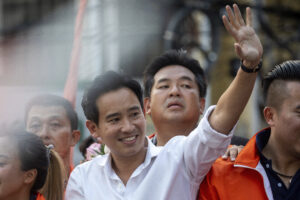Pakistan Needs to End the Military’s Role in Politics
Reviving the 2010 reform process could be key to resolving Pakistan’s continued crises, but reforms must target the military's massive business empire. Pakistan Day Parade / Wikimedia Commons
Pakistan Day Parade / Wikimedia Commons
For the past year or so, Pakistan has been in the grip of continued crises. Imran Khan’s party, Pakistan Tehreek-i-Insaf has been mobilizing to demand fresh elections since April 2022, when Khan’s government came to an abrupt end after a vote of no-confidence. The economy is in shambles, with the threat of default looming over Pakistan. Khan’s mobilization has targeted both the incumbent government under Shehbaz Sharif for its failure to revive the economy and the military establishment for its political interference—specifically, for its role in ousting the Khan administration.
This political instability is leading to increased unrest. The outlawed Tehreek-i-Taliban Pakistan (TTP) is resurgent once again, targeting security forces as well as locals in the former Federally Administered Tribal Areas of Khyber Pakhtunkhwa province. People in the area have been protesting the TTP’s resurgence for months, demanding decisive action from the state against the globally designated terror group. In Balochistan, the Gwadar Rights Movement has re-emerged, demanding an end to illegal fishing in the neighboring sea by international—mostly Chinese—companies. The movement’s demands reflect the province’s overall exclusion from the political and economic structures of the state and its historic struggle for rights, power and control over its natural resources.
Pakistan needs immediate and radical reforms to stabilise the polity and avoid a total collapse. To this end, re-starting the 2010 reform process to tackle these issues is critical. Understanding what needs to happen requires first getting a grasp on what was changed in 2010 and what was left unchanged.
The military’s continuous domination of the state means that its ability to shape national policies without the participation of the civil administration remains well intact.
In 2010, Pakistan’s Parliament passed the 18th constitutional amendment, which changed almost 40 percent of the Constitution. Apart from reversing some of the changes made by the military regime of Pervez Musharraf, such as the 17th amendment, the 18th amendment also abolished the Concurrent Legislative List, which defined areas where the federal government and provincial governments had parallel powers, and made the provinces autonomous. The amendment also sought to make the Parliament supreme, even giving it a role in appointing Supreme Court judges. That changed with the 19th amendment, passed later the same year, which took these powers away from the Parliament and vested them in the chief justice. This made the judicial system fully independent, which heralded an era of judicial activism, or what is today called undue judicial interference, in Pakistan’s politics.
For all that, the 18th amendment process did nothing to put civilian supremacy on a firm footing. While the amended Article 6 took away the judiciary’s power to legitimize military coups, the reform process fell short of removing the material basis for the Pakistan military’s enduring might—that is, the multibillion-dollar industrial empire controlled by the military establishment. In Indonesia, which once faced a similar problem, the 1999–2004 reform process ended the military’s dual role (dwifungsi) in politics and defense and brought its businesses under the control of a civilian administration. Pakistan took no such step. This has been a key reason for continued military interference in politics after 2010, which is a root cause for many of the problems Pakistan is facing.
For instance, a principal reason behind civilian—and militant—unrest in Balochistan is the military’s domination of the province, which perpetuates what many Baloch nationalists call a “colonial” system of exploiting the province’s resources while excluding them from power. The situation is exacerbated by the fact that the Baloch people have a marginal presence in the military itself. Even though the 18th amendment reform process urged an enhancement of “minority” representation in state institutions, including the military, very little has changed, and the armed forces continue to be dominated by Punjabis. Parliamentarians from Balochistan and other provinces beyond Punjab often argue that recruits from these provinces remain limited to the lower ranks, with promotion to the officer ranks being rare.
The military’s continuous domination of the state means that its ability to shape national policies without the participation of the civil administration remains well intact. For instance, one of the key reasons the TTP is resurgent is the failure of a peace process that the military establishment started with the group without involving the Parliament. The military establishment also exercises its dominance to bring about political shifts—for example, as I explained in a previous edition of Himal Briefs, by supporting or opposing certain political actors as a matter of political expediency. It was the military’s interference in politics that brought the Imran Khan regime to power in 2018, which started an era of economic mismanagement that many believe is at the heart of Pakistan’s current economic woes.
The military’s vast business empire needs to come under state, and so civilian, control.
With the military tied to all the country’s ethnic, security, political, and economic troubles, it is imperative that Pakistan ends the structural imbalance created by the military’s dominance and marginalization of representative institutions. In Indonesia, the reform process that constitutionally de-politicized the military became possible after a mass movement, led by students and supported by leading political players, emerged in the wake of the 1997 Asian financial crisis. In 2007, Pakistan faced a somewhat similar situation when the Lawyers’ Movement looked to end the military regime of Musharraf and de-politicize the military. But the reform process fell short of accomplishing a thorough structural overhaul as no group, whether from civil society or politics, targeted the military’s business interests. Imran Khan—who has significant popular support for his anti-military narrative, which many believe he must build on to push for radical changes—has repeatedly called for the military’s non-interference in politics as a prerequisite for economic and political stability. But he too is not particularly targeting the material basis of the military’s lasting power. The 2010 reforms targeted the military’s interference in politics only in terms of preventing coups. But the experience of the past 12 years—when Pakistan has come to be ruled by a kind of hybrid martial-law system— shows that the country’s political elites need to go well beyond the question of military neutrality and target its ability to operate autonomously, as a state within the state.
Three specific areas need reform. First, as mentioned above, the military’s vast business empire needs to come under state, and so civilian, control. Second, this process must be reinforced by cutting military spending, which according to my estimate consumes almost 50 percent of Pakistan’s total annual budget (official estimates place the figure at around 16 percent, while acknowledging that the real share is much higher). Third, Pakistan needs to make its military more diverse by increasing the representation of minority ethnic groups. As various academic studies looking at other countries have shown, changes in the armed forces’ ethnic complexion often reinforce changes in national politics.
The military’s exit from politics would not only stabilize civilian democracy but also strengthen the Parliament, as the country’s supreme body that is directly accountable to the people. Selectorate theory, often taught in political science courses, shows that politicians tend to perform well on the economy only when their winning coalition—that is, the constituencies of support they need to stay in power—comprises the masses rather than unelected institutions, including the military. Leaders tend to make policies that yield maximum benefit or output for their key vote bases. This pattern of politics is unlikely to be strengthened when a single, unelected institution is able to dominate the polity. To change this, a radical process of constitutional reforms—and political engineering—is a must. The moot question, however, is whether the relevant elites of civilian politics in Pakistan will move in this direction.
This article originally appeared at Himal Southasian (www.himalmag.com).
Your support matters…Independent journalism is under threat and overshadowed by heavily funded mainstream media.
You can help level the playing field. Become a member.
Your tax-deductible contribution keeps us digging beneath the headlines to give you thought-provoking, investigative reporting and analysis that unearths what's really happening- without compromise.
Give today to support our courageous, independent journalists.






You need to be a supporter to comment.
There are currently no responses to this article.
Be the first to respond.